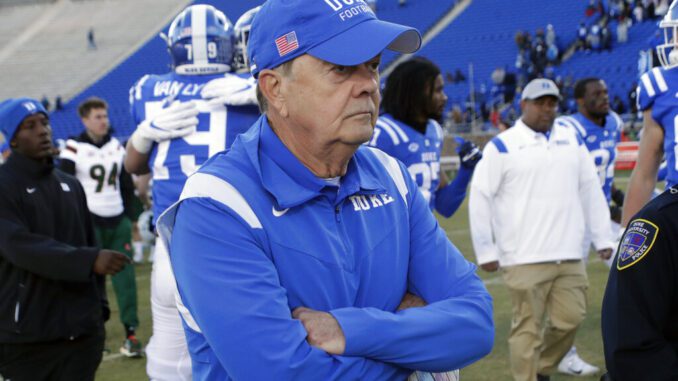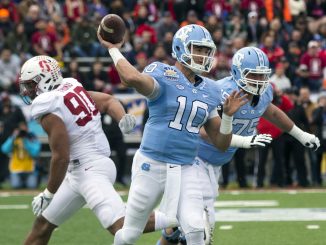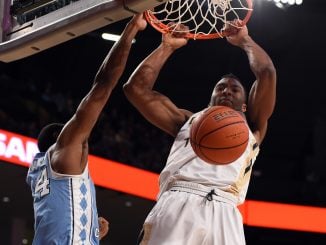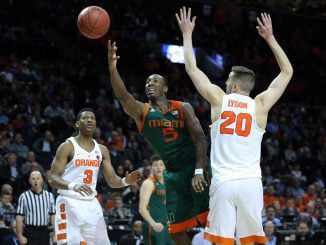
Just before Christmas 2007, David Cutcliffe walked into the Duke Sports Medicine building and began shaking hands.
It was his first week on the job, and back then, Duke football shared a building with sports medicine — the press box and coaches’ booths were on one floor, the patients getting treatment, on another.
“He was going around campus, introducing himself to everyone,” said Bobby Saunders, who worked at the Sports Medicine clinic, greeting and checking in patients. “He wasn’t the first coach to do that, but it was definitely rare.”
On the day of his job interview, Cutcliffe — whose 14-year run at Duke is ending — arrived on campus early, in the predawn hours and chatted with the housekeeping staff at the football building. It was then that he called his wife and informed her, “You know, I think I’m going to take this job.”
“Have the offered it?” she asked.
“No, but they will.”
Cutcliffe introduced himself to the clinic staff, and, while shaking hands, he noticed the orange T on Bobby’s Tennessee wristwatch.
“We talked about Tennessee a little bit,” Bobby said. “Every once in awhile, he’d stop by for five or 10 minutes to talk football. He had plenty of people on campus to talk about Duke, but I was his Tennessee guy.”
Cutcliffe, a man who texted the Manning brothers during the week leading up to their Super Bowl appearances, continued to visit his new friend at the Duke Clinic’s reception desk on a regular basis. That August, as Cutcliffe prepared for his first game as Duke coach, Bobby stopped by the football office.
“I was going to pick up some more pocket schedules,” he said. “We like to have them to give to patients.”
Coach Cut stepped out of his office as Bobby arrived, and the two friends chatted for the first time on Cutcliffe’s turf instead of his. As Bobby left to head back to work on the other side of the stadium, Coach Cut extended an invitation.
“He told me, ‘I’m having a press conference at lunchtime. Come on by,’” Bobby recalled.
It was the media lunch that Cutcliffe held every week that Duke had a game, at least until a global pandemic rendered that impossible.
Bobby attended the new coach’s game-week press conference, sitting in the back of the room, behind the small crowd of local reporters in attendance.
“I didn’t say anything or talk to anyone,” Bobby said. “I didn’t even think Coach knew that I was there.”
He didn’t eat the meal that was provided to reporters. As he said, “Coach invited me to come listen to him speak. He didn’t invite me to eat.”
Bobby wasn’t entirely sure whether he had a standing invitation, but he went back on the following Tuesday.
“I went for the first five weeks,” Bobby said. “I never quite knew what he thought or if he even knew.”
A smile crossed Bobby’s face as he explains how he found out.
“My wife and I spend a week at the beach every October,” he said.
“I came back to work the next Monday and everyone came up to me, all excited,” Bobby said. “They said, ‘Coach Cut was here looking for you!’ He came into the clinic first thing Wednesday morning to check on me and see why I wasn’t there.”
“That’s the kind of man he is,” he concluded.
For the next seven years, until he retired from Duke, Bobby attended the media luncheon every week, missing only the one each year that conflicted with his October vacation. He would bring a brown bag lunch from home containing a ham sandwich and Diet Coke.
While Cutcliffe could never get him to take the free lunch, Bobby pointed out that every year, someone from the Duke football training staff would bring him a new Duke polo shirt, similar to the ones the coaches wear on the sideline. “I don’t know that they’re from Coach,” he said. “The trainers will never admit that they’re from Coach Cut, but …”
Cutcliffe will leave Duke better than he found it, just as he does everywhere he goes and everyone he meets.
It was supposed to be impossible to win there, but all it took was finding an honorable Southern man with a brilliant football mind, a man who learned under Bear Bryant and taught Peyton and Eli. It took a man who believed he could do the impossible and is able to convince others to come with him. It took a man that was raised to work hard and ask for nothing.
It took a man who pays meticulous attention to detail, right down to a familiar face missing from the back of the room and thinking it’s important to find out why.



